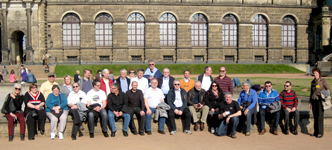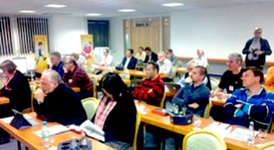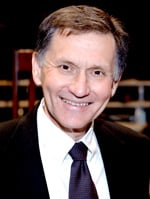MENU
(April 13, 2012 - by Ralph Kurtenbach) You'll win neither applause nor plaudits by telling your audience what they've done wrong … or how unpopular they've become. But this didn't faze Wayne Pederson, an invited speaker at the recent Fellowship of European Broadcasters (FEB) conference.
 Pederson, the president of HCJB Global, in fact seemed to turn platform decorum and rules of public speaking on their ear. At the March 22-25 gathering in Dresden, Germany, he referenced potentially unnerving topics such as a flat world, common oversights in spreading the gospel, and people's poor perceptions of evangelicals-a term he doesn't regularly use in describing himself.
Pederson, the president of HCJB Global, in fact seemed to turn platform decorum and rules of public speaking on their ear. At the March 22-25 gathering in Dresden, Germany, he referenced potentially unnerving topics such as a flat world, common oversights in spreading the gospel, and people's poor perceptions of evangelicals-a term he doesn't regularly use in describing himself.
"In discussions with those outside the faith, I find almost anywhere in the world that when I refer to myself as a follower of Jesus, they respect that … they understand that," Pederson explained. "And if you truly examine what it means to be a follower of Jesus in the strictest and thorough sense, it means repentance of sin, trusting Him as Savior, helping the poor, living a godly life and being willing to lay down your life for the sake of His kingdom. That's pretty heavy stuff."
Contrasting compassionate, relational Christianity with a doctrinaire stance perceived by unbelievers as political, unloving and judgmental, Pederson spoke on the topic, "Voice in Society-Us!" He began with a remark attributed to a high-profile non-Christian, Mahatma Gandhi, "I like your Christ. I do not like your Christians. They are so unlike your Christ."
"Only a small percentage of outsiders strongly believe that the labels 'respect, love, hope and trust' describe Christianity," said Pederson after citing segments of David Kinnaman's book, UnChristian. He then proceeded to propose ways to shift perceptions-by esteeming and serving outsiders.
"This means being compassionate, soft-hearted and kind to people who are different from us, even hostile toward us…. Our future reputation as Christians is intricately connected to our passion for justice, service and sacrifice," challenged Pederson.
"Wayne found an audience willing to listen to his thoughts because of the fading reality of Christianity in Europe," observed David, an attendee who directs HCJB Global's Europe/Eurasia Region. "People understood where he was coming from even though what he said was radical in some ways."
 In an earlier message to the same group, Pederson referred to an accusation against Jesus as being a friend of sinners-an accusation he deemed "the highest compliment one could give to a follower of Jesus."
In an earlier message to the same group, Pederson referred to an accusation against Jesus as being a friend of sinners-an accusation he deemed "the highest compliment one could give to a follower of Jesus."
"Are we known as friends of sinners? Or are we viewed as the enemies?" he questioned. "Are we so neatly put together in our little circle that we can't possibly impact society? Who is reaching the prostitutes, the embezzlers, the imprisoned, those with HIV/AIDS, the foreigners and the children? Are we too good to do that? Are we too good to be known as Christ-followers?"
Pederson cited radio programmer Ron Hutchcraft's list of dangers Christian broadcasters face in spreading the gospel: "Missing the lost, missing the young, talking too much, leaving the middle (focusing on peripheral doctrinal matters) and following the money."
"Today we have the same unprecedented opportunities to share the gospel around the world with our new media tools, our global economy, and interdependent cultures," Pederson declared. "As we all know, the world today is flat. We're in a globalized, urbanized, secular world. It's a world more like the Roman Empire than anything in centuries."
Afterwards Pederson contrasted this year's conference with his time at FEB a decade earlier concluding that "this year's conference was energetic and forward thinking."
"Where 10 years ago there was little opportunity for Christian media in Europe, today the group is using new media technologies-Twitter, Facebook, YouTube, text messaging-to reach the region with the gospel. It's a new day in Europe today," he said.
Source: HCJB Global
 Pederson, the president of HCJB Global, in fact seemed to turn platform decorum and rules of public speaking on their ear. At the March 22-25 gathering in Dresden, Germany, he referenced potentially unnerving topics such as a flat world, common oversights in spreading the gospel, and people's poor perceptions of evangelicals-a term he doesn't regularly use in describing himself.
Pederson, the president of HCJB Global, in fact seemed to turn platform decorum and rules of public speaking on their ear. At the March 22-25 gathering in Dresden, Germany, he referenced potentially unnerving topics such as a flat world, common oversights in spreading the gospel, and people's poor perceptions of evangelicals-a term he doesn't regularly use in describing himself."In discussions with those outside the faith, I find almost anywhere in the world that when I refer to myself as a follower of Jesus, they respect that … they understand that," Pederson explained. "And if you truly examine what it means to be a follower of Jesus in the strictest and thorough sense, it means repentance of sin, trusting Him as Savior, helping the poor, living a godly life and being willing to lay down your life for the sake of His kingdom. That's pretty heavy stuff."
 |
| HCJB Global President Wayne Pederson |
"Only a small percentage of outsiders strongly believe that the labels 'respect, love, hope and trust' describe Christianity," said Pederson after citing segments of David Kinnaman's book, UnChristian. He then proceeded to propose ways to shift perceptions-by esteeming and serving outsiders.
"This means being compassionate, soft-hearted and kind to people who are different from us, even hostile toward us…. Our future reputation as Christians is intricately connected to our passion for justice, service and sacrifice," challenged Pederson.
"Wayne found an audience willing to listen to his thoughts because of the fading reality of Christianity in Europe," observed David, an attendee who directs HCJB Global's Europe/Eurasia Region. "People understood where he was coming from even though what he said was radical in some ways."
 In an earlier message to the same group, Pederson referred to an accusation against Jesus as being a friend of sinners-an accusation he deemed "the highest compliment one could give to a follower of Jesus."
In an earlier message to the same group, Pederson referred to an accusation against Jesus as being a friend of sinners-an accusation he deemed "the highest compliment one could give to a follower of Jesus.""Are we known as friends of sinners? Or are we viewed as the enemies?" he questioned. "Are we so neatly put together in our little circle that we can't possibly impact society? Who is reaching the prostitutes, the embezzlers, the imprisoned, those with HIV/AIDS, the foreigners and the children? Are we too good to do that? Are we too good to be known as Christ-followers?"
Pederson cited radio programmer Ron Hutchcraft's list of dangers Christian broadcasters face in spreading the gospel: "Missing the lost, missing the young, talking too much, leaving the middle (focusing on peripheral doctrinal matters) and following the money."
David recalled that Pederson then offered the example of Henryk Krol from HCJB Global Voice partner CCM Media in Poland, who was in the crowd.
 |
| A choir performs at the opening night of the FEB conference. |
Krol's network of stations has "totally changed its programming to a more secular format to attract more non-Christians so they can hear the gospel," David said.
In his message, "Voice in Society-Paul," Pederson recounted that the early church was birthed and expanded in a culture hostile to Christianity, yet the cultural advances during Pax Romana such as mobility, language, wealth and diversity offered an environment for the spread of the gospel."Today we have the same unprecedented opportunities to share the gospel around the world with our new media tools, our global economy, and interdependent cultures," Pederson declared. "As we all know, the world today is flat. We're in a globalized, urbanized, secular world. It's a world more like the Roman Empire than anything in centuries."
Afterwards Pederson contrasted this year's conference with his time at FEB a decade earlier concluding that "this year's conference was energetic and forward thinking."
"Where 10 years ago there was little opportunity for Christian media in Europe, today the group is using new media technologies-Twitter, Facebook, YouTube, text messaging-to reach the region with the gospel. It's a new day in Europe today," he said.
Source: HCJB Global
